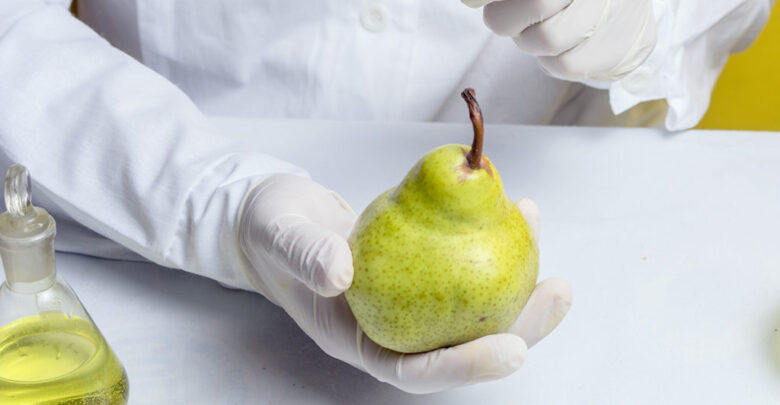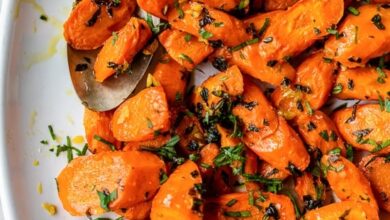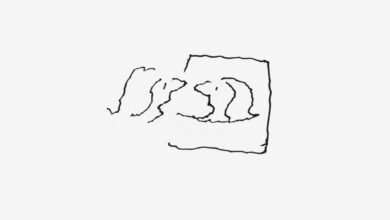Superstition, science belief, and how to stop thinking about your food choices.

What if I told you to start my morning with a glass of lemon water?
Maybe you think:
& # 39; Who cares ?! Why is it important what Berardi drinks first thing in the morning? "
You wouldn't be wrong.
But if you're a certain type of person – the kind who loves to study nutrition science – this might pique your curiosity (and maybe a little FOMO).
Maybe you would ask:
“Why add lemon? For digestion? Liver Detoxification? Antioxidant protection? "
In other words:
“Does lemon contain any super biochemical power that I haven't yet learned from? And if so, should I record it myself? "
If you're a different type of person – more of a skeptical nature – you may be less curious and upset:
"Ugh – more detoxifying BS?!? Detox isn't even a thing. I thought you were evidence-based! "
If you are up to date with the latest research, you could even say:
“Lemons, really? Didn't you do your research? Don't you know that (enter nutrient / supplement du jour) has proven to be more effective? "
So, just in case you're wondering, here's the real reason I drink lemon water in the morning:
I wake up thirsty. And I like the taste of lemon in my water.
(Keyword anti-climactic music.)
Yes that's it.
That's the big secret of my drink choice.
I am not trying to aid detoxification or digestion of the liver.
I also don't try to add antioxidant power or change my body's pH.
(I'm not an "industrial shilling for Big Lemon" either. I promise.)
I just like the taste.
If this answer disappoints you – or you've already been halfway to the store for some lemons – you might need to listen to what I'm about to say.
Because I think it's time we stopped overeating our food.
Before we go any further, I have to admit something.
I am guilty of exactly what I am criticizing in this article. In fact, you can hold me responsible for the whole problem if you like.
At the beginning of my career I wrote A LOT, maybe too much, about the biochemical and physiological properties of food.
I've published article after article examining various signaling pathways in fat and muscle cells and the specific nutrients that might alter them.
Well, I had no intention of starting a trend that was too focused on the scientific properties of foods. To be honest, I didn't really think twice about my intention. (That was kind of the problem).
I was just really interested in biochemistry and physiology.
As a PhD student, publishers gave me a platform to share what I was learning, what I was experimenting with (in the laboratory) and what I found fascinating.
And when I co-founded Precision Nutrition, I was able to reach and influence even more people.
On the way, the readers orientated themselves on me.
Trainers, coaches and other "nutrition nerds" also fell into the rabbit hole. They followed my interests. They began to focus on the biochemical and nutritional details of food. And like me, they shared their interests, thoughts, and experiments with others.
A chain reaction started.
But with the development of Precision Nutrition, my perspective changed.
My understanding of food has expanded.
I came to believe (as I still do) that food is not just fuel. That no single diet is generally superior. And that there are many more considerations when it comes to eating than "How does nutrient X affect pathway Y in my body?"
Don't get me wrong: understanding the scientific properties of food helps – up to a point.
There's a reason PN teaches the science of nutrition in the Precision Nutrition Level 1 Nutrition Coaching Certification: because it's useful to understand the “why” behind diet recommendations before you distribute them to your clients.
But when I look around these days, I see a lot of people who focus heavily on the biochemical and physiological aspects of food.
Call it overeating, over-intellectualization, or over-science. Whatever you call it, it is characterized by an almost obsessive interest in the nutritional and physiological aspects of a particular food.
And we have to suppress that. Or at least make up for it.
People always ask me, "Why did you choose THIS food / ingredient / supplement?"
Sometimes I share pictures of what I eat on Instagram.
Either a single meal or a full day of meals.
People always ask me how I eat and on occasion I follow up by sharing my own meals or what our family eats.
But the same thing happens every time: people send out a barrage of questions, most of which have to do with the physiological or health value of a particular inclusion (or exclusion). I'm trying to answer the questions, but honestly it's hard to keep up.
This is a photo from my last breakfast, with captions annotated to give you a taste of the back and forth. You can see all of the Q&A in my original Instagram post.
No matter how much I explain, the questions keep coming back. Here is an excerpt from recent posts from various meals.
- Why are you adding lemon to your water?
- Why don't you eat sweet potatoes or brown rice or (my favorite starchy carbohydrate source)?
- Why don't you eat pineapple, watermelon or (my favorite fruit)?
- Why don't you drink milk, eat cheese or (my favorite milk)?
- I see you are eating sauerkraut. Why not kimchi?
- I see you are using collagen protein. Why not whey?
- Are you taking a vitamin or protein supplement or a probiotic? Which brand? Which species? To what use? But what about the research that says X or Y or Z?
You have the idea.
Hence my lemon water example from earlier. Every time I show a meal with a glass of water with lemon, people are deeply concerned about the “health value” of the lemon.
In essence, it feels like everything the nutritionist eats MUST have a scientific reason to be ingested.
People seem disappointed or dissatisfied when I tell them I'm adding it because I like the taste. Or it's one of my favorite dishes. Or it was everything I had available that day.
Also, when I don't include a particular food on a particular day, like brown rice, mangoes, or coffee, people get really confused as to whether I think the missing food is somehow "bad for you".
Anything the nutritionist does not eat MUST ALSO have a scientific reason for exclusion.
But here is the truth:
Not every food decision I make is based on science.
Sometimes I eat food because I like it. (Shocking, I know) Or because they make me feel good. Or because our children want me to share a certain meal with them.
I also often avoid other foods that I don't like. Or that makes me feel guilty. (Yes, even the "healthy" ones.) Or they are not easily accessible to me.
Here is an example I recently posted about.
In self-experiment I learned that tomatoes and peppers can flare up the osteoarthritis that puts strain on my knees.
So I mostly avoid them.
Although I like to eat them. While there isn't much data to suggest that nightshades like tomatoes and peppers are problematic. I reduce them in my diet because they make me feel bad.
Now just because I stopped eating them …
Am I saying tomatoes and peppers (or any other nightshade family) will affect anyone with osteoarthritis?
No.
Can I tell you for sure that it is the biochemical properties of the tomatoes and peppers that affect me and not something else (like the placebo effect)?
No.
Am I suggesting that other people stop eating tomatoes and peppers?
Definitely not.
They just don't work for me.
So what's wrong with neglecting your diet?
As I said, I am a scientist. There is nothing wrong with knowing your facts.
But this hypernutritionalization can be problematic in several ways:
# 1: Your "research" may not be that good.
It is time to make something real.
Nutritional science is complex and relatively early in its development. That means there is a lot of research out there that is open to interpretation.
(And very few absolute hard and fast rules that apply to everyone.)
Hence, it is not difficult to find research that justifies our own preferences.
Imagine…
Suppose I enjoy a glass of lemon water in the morning. So I think to myself, “Hmm, maybe this has a health benefit. Let's find out. "
So I visit PubMed (the world's largest index of biomedical research) looking for scientific studies that support the use of lemon water.
Or I google something like: "Health benefits of lemon water in the morning". (Give it a try. You will get many results.)
Bingo. Now I can start getting the news about the virtuous lemon water – and pat myself on the back for having enjoyed my superior morning drink.
Do you see the problem here?
We are biased. This type of "research" is often a desire to justify our preferences and natural inclinations with "evidence".
This is a dangerous practice that creates self-justification and a certain kind of "evidence blindness" to research that does not support one's preferences.
It also signals the end of the curiosity that is at the heart of scientific research.
And that happens all the time, even to bright people and good thinkers.
They let their information searches guide their personal preferences, rather than legitimately trying to get to the bottom of what people know (or can know) about a particular topic. Once they find the research that supports what they wanted to do anyway, they convert it to "proven" or "evidence-based".
But the “knowledge” gained in this way is incomplete at best.
At worst, it's not really knowledge at all.
# 2: Food is more than its biochemical makeup. (And so do we.)
If we focus on the science behind our food intake, we are missing out on other eating benefits, such as:
- Cultural practices / traditions
- Enjoyment and joy
- Expressing hospitality or spending time with family and friends over dinner
- How they make us feel, physically or otherwise
Just as “health” is more than “not being sick”, food is more than just nutrients.
And in this respect the human being is much more than our biochemical and physiological structure.
Whether a food “works for us” in the context of our daily life has more to do with research.
It also has to do with our goals, our preferences, our lifestyle, our cooking skills, our cultural background, our eating and living situation, our access to certain foods, our taste buds, our social determinants of health and much more.
Sure, there are some general nutritional basics that will work for most of us, but that doesn't mean anyone is doing it wrong choosing regular whole grain oats over steel oats.
# 3: It promotes judgment and the moralization of food.
In a recent Instagram post, I mentioned that I have had "zero alcohol" for three years and that I believe this has contributed in a small part to some positive health outcomes, particularly when it comes to hormonal health.
This statement has been interpreted as an asset to those who have "a clean diet" or "good health" or "why would you put this poison into your body?" Way of thinking.
Many people virtually patted me on the shoulder for this choice – as in: “Exactly! Alcohol is poison! "
Meanwhile, others felt it was a personal affront. Like attacking her choice to drink.
But for me it is not a moral choice not to drink. Or a tribal. Personally, I abstain because avoiding alcohol seems to help with my autoimmune disease.
And to be honest, I never drank that much anyway. (Alcohol makes me irritable and sleepy, which is annoying in itself and makes me go home in social situations.)
But just because I don't drink doesn't mean that I look for all the information I can find about why alcohol is bad for everyone and then proselytize against it. I understand that it fulfills different needs for different people. And that some of them might be healthy on balance … in the right context. (For examples, see: Would I be healthier if I stopped drinking?)
Conclusion: I am neither anti-alcohol nor am I pro-alcohol; I just made a decision that felt the best for me. And my point is here:
Somebody else's choice of food – scientifically proven or not – shouldn't get you into a tailspin.
Nor should your personal food choices be the basis for telling others what they should or shouldn't do, regardless of what your self-directed scan of research tells you is "right" or "wrong".
When you do both, it's time to back down and gain perspective.
I cannot recommend "best food" or "best diet", but I do recommend it.
Try to stay open-minded.
It is up to you to find the foods that you enjoy eating that will add to your goals, whatever they may be.
And when you're a coach, it's your job to help your clients find those foods – and these goals – for themselves.
A healthy relationship with food doesn't require you to revise every small decision or have a scientific rationale for everything you choose.
Once you understand the basics of how various nutrients work in the body, a healthy relationship with food can mean the exact opposite … broadening your perspective on food beyond "scientific benefits."
Yes, it can take time and practice to understand what works best for you, your body, your family, and your lifestyle. And to enjoy this food without thinking about it.
That’s the bottom line here.
To realize this, at the beginning of your "healthy diet" you may need to spend more time learning about your food in order to make better, more thoughtful choices.
But at some point you may need to take a step back and try to fit this new knowledge into the context of your real life. To put it in a wider, more robust framework for eating decisions.
Because if you go too far here, your ideas about food can end in superstition or "belief in science". When that happens, it's difficult to be objective. It's difficult to stay curious and open-minded. It is difficult to learn something, for yourself or for your customers.
So this is your first experiment.
Back from the research database. Make yourself a meal without overanalysing it. And while you're at it, pour yourself a glass of water. Lemon or no lemon? It's your decision.
If you are or would like to become a trainer …
Learning how to coach clients, patients, friends, or family members through healthy eating and lifestyle changes – in ways that are tailored to their unique bodies, preferences, and circumstances – is both an art and a science.
If you want to learn more about both, consider the Precision Nutrition Level 1 Certification.



